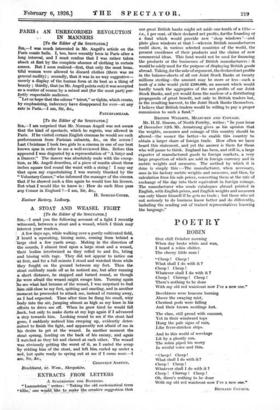EXTRACTS FROM LETTERS
A SUGGESTION FOR BANKERS. "Lanenstriallt", writes: "Taking-the old ecclesiastical term 4 tithe," one wirld;like As)Fete the creative suggestion that our great British banks might set aside one-tenth of a tithe- i.e., 1 per cent.. of their declared net profits, for the founding of a fund which would provide new shop windows '—and plate glass windows at that I—wherein British manufacturers could show, in various selected countries of the world, the present excellence of their products and the claims of new commercial ideas. This fund would not be used for financing the products or the businesses of British manufacturers : it would be solely used for the purpose of displaying British goods' abroad. Taking, for the sake of argument, the declared net profits in the balance-sheets of all our Joint Stock Banks at twenty millions sterling—the amount may be more or less—such a tenth of a tithe would yield £200,000, an amount which would hardly touch the aggregates of the net profits of our Joint Stock Banks, and yet would form the nucleus of a distributing propaganda of great benefit, not only to British traders but, in the resulting harvest, to the Joint Stock Banks themselves. I believe that' British traders would be willing to pay a proper commission to such a fund."
• BRITISH WEIGHTS, MEASURES AND COINAGE.
Mr. H.H. Sissons, of North Ferriby, writes : " in your issue of December. 12th Mr. Armstrong gives as his opinion that the weights, measures and coinage of this country should be altered—the sooner the better—to enable this country to obtain a larger shire of foreign trade. How often we have heard this statement, and yet the answer is there for those. who will pause to think. England has been, and still is, a large exporter of manufactured goods to foreign markets, a very large proportion of which are sold in foreign currency and in metric weights and measures. The method by which it is dohe is simply this :—The manufacturer, when necessary, uses in his factory metric weights and measures, and then, by calculation fixes his sale prices, converting them at the rate of exchange of the day into their equivalent in foreign coinage. The manufacturer who sends catalogues abroad printed in English, with English prices, and English weights and measures can only blame himself if he gets no trade ; but those who set out seriously to do business know better and do differently, including the sending out of trained representatives knowing the language."


























































 Previous page
Previous page